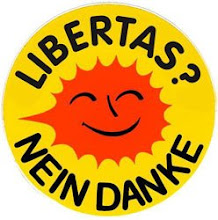Far right fundamnatalist campaigner were responsible for achieving the incongruous No vote in two Irish constituencies in the remote Nort West of the country in Co. Donegal. However the area also has a strong Sinn Fein grassroots as it borders Co. Derry and is a county where many senior Sinn Fein and former IRA bigshots have houses, on the so called Costa Del Provo.
The far right campaign in the rest of the country was utterly rejected.
It is clear that in the months and years ahead a concerted effort will have to be made to identify the far right groups funding Irish activists and to expose their front organisations, such as Libertas, COIR, We The People, Taxi Drivers for Change, and more.
This blogger has noticed a proliferation of different front organisations and web sites that advocate anti immigrant and socially repressive measures aimed at gays and women and, what this blogger deems to be a racist term so called "non-nationals".
For the record the so called "non-nationals" come from somewhere and should be accorded the respect of being called by their nationality rather than a generic term that indictaes difference and helps engender sucpicion and distance.
Ireland has voted YES to being European so let us embrace that fact and the peoples of Europe and the world, just as we are accorded respect in Europe and elsewhere.
Right-wing groups linked to No vote in DonegalCHRIS ASHMORE
DONEGAL: RIGHT-WING pro-life groups who were fearful of European intervention on social issues were a factor in Donegal North East, which returned the highest No vote in the country, it has been claimed.
Although there was a 13 per cent swing to the Yes camp, Donegal North East returned a No majority, with 51.5 per cent against and 48.5 per cent for.
Fianna Fáil Senator Cecilia Keaveney said: “The church factor was huge.”
She noted that, at a recent Joint Committee on European Affairs in the Oireachtas, Bishop Noel Treanor, Bishop of Down and Connor and formerly secretary general of the Commission of Bishops’ Conferences of the member countries of the EU, was invited to present the church’s position on the treaty.
Bishop Treanor had stated unequivocally that a Catholic could, in good conscience, vote Yes. There were no grounds to justify a No vote in the treaty on the basis of specifically religious or ethical concerns, she maintained.
However, some right-wing Christian groups openly called for a No vote, said Ms Keaveney, who canvassed outside Catholic churches in the Inishowen electoral area in Donegal North East.
She said she was surprised by the strength of feelings, and expressed disbelief at some of the literature handed out outside churches in recent weeks.
One pamphlet, she said, raised concerns about “pressure from the EU to encourage legislation on abortion, homosexual unions and in various other areas in which the Catholic social and moral teaching would be adversely affected”.
Sinn Féin Senator Pearse Doherty claimed on Highland Radio that both Tánaiste Mary Coughlan and Fianna Fáil MEP Pat the Cope Gallagher had a lot of questions to answer about their performances given that both Donegal constituencies voted No.
Ms Coughlan tried to take comfort in a slight reduction in the No vote (50.3 per cent compared with a national figure of 32.9 per cent) in her Donegal South West constituency. However, there was no hiding her disappointment at the result.
“Myself and Pat the Cope Gallagher have done all we could, and we always knew this was going to be a hard-fought battle. We have, however, made up a lot of ground on the last time nationally.”
Fianna Fáil TD Niall Blaney was disappointed with the result, although he noted the Yes vote had increased significantly. The onus was on politicians to “sell the European project a bit more”.
Fine Gael TD Joe McHugh said there was a “sense of dislocation” in Donegal. The county lacked the big-business, pro-treaty campaign that was obvious in counties like Kildare.








![[Irish airline Ryanair boss Micheal O'Leary shows his support for the Lisbon Treaty in Dublin, Ireland, on September 29, 2009. ]](http://s.wsj.net/public/resources/images/OB-EO344_yesvot_D_20090930041234.jpg) AFP/Getty Images
AFP/Getty Images 





